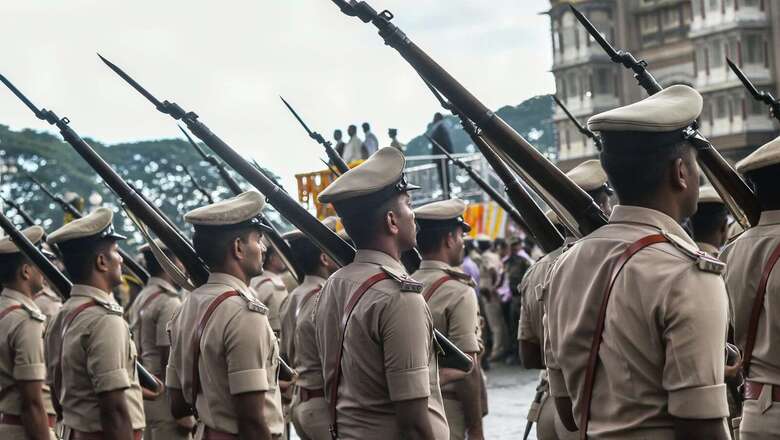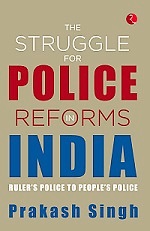
views
The Constituent Assembly debates (1947 to 1949) show that several members had serious reservations about the role of the All India Services in independent India. Their attitude was coloured by their experience of these services during the Independence struggle, when the officers, at the behest of the imperial power, came down heavily on the freedom fighters. Sardar Vallabhbhai Patel stoutly defended the services and expressed his optimism that the services would, in the changed circumstances, be patriotic and motivated by the highest ideals of service to the country. Some of his observations are recorded below:
They are as good as ourselves, and to speak of them in disparaging terms in this House, in public, and to criticise them in this manner, is doing disservice to yourselves and to the country. The Police which was broken has been brought to its proper level and is functioning fairly efficiently. The Heads of the Departments of the Police in every province are covered under this guarantee. Are you going to change that? Are you going to put your Congress volunteers as captains? What is it that you propose to do? As a man of experience I tell you, do not quarrel with the instruments with which you want to work. It is a bad workman who quarrels with his instruments. Take work from them. Every man wants some sort of encouragement. Nobody wants to put in work when every day he is criticised and ridiculed in public. Nobody will give you work like that. These people are the instruments. Remove them and I see nothing but a picture of chaos all over the country. They are men who prefer honour, dignity, prestige and deserve the affection of the people.
Patel’s thinking ultimately prevailed. The Constitution of India, which was adopted on 26 November 1949, had a chapter devoted to the Services. Article 312(2) thereof stated: ‘The services known at the commencement of this Constitution as the Indian Administrative Service and the Indian Police Service shall be deemed to be services created by Parliament under this article.’
The Partition in 1947 had thrown up problems of enormous magnitude. There was huge movement of populations across the borders and there were communal riots over large parts of the country. Subsequently, the country was witness to unrest over the reorganization of the states, Naga rebellion in the Northeast, language riots in the South and a host of other problems. The police, according to M.V. Narayana Rao, a celebrated police officer, came out, with rare exceptions, ‘in flying colours’. Prime Minister Indira Gandhi, while addressing the Inspector Generals’ (IGs) Conference on 23 February 1966 paid tribute to the police for having handled the various problems very well. In those turbulent years, what was lost sight of was that a new role, a new philosophy for the police needed to be defined, and that its accountability to the law of the land and the people of the country had to be emphasized in clear terms. As a result, ‘the relationship that existed between the police and the foreign power before independence was allowed to continue with the only change that the foreign power was substituted by the political party in power’.
For some years after Independence, however, there was no problem, thanks to the quality of political as well as administrative leadership. The politicians were men of great stature, endowed with vision and committed to pursuing national interests. The administrators were also thorough professionals, keen on playing their role in independent India. The politician drew from the professional experience and expertise of the civil servant who, in turn, benefited from the politicians’ commitment to democracy and secularism. There was mutual respect, give and take in pursuit of the common objective of taking the nation forward on the road to progress and modernity.
**
MY EXPERIENCE
During my nearly 35 years of career, I felt, more than once, that the police organisation needed systemic reforms. External pressures, particularly from the political class, are quite often overwhelming. Only extraordinary officers are able to withstand these, and even they have to pay the price. The majority of officers prefer to swim with the current. The overall result of this trend has been a gradual decline in professionalism and poor delivery of services to the people. A stage came when most of the serving officers of the state carried an invisible party stamp on their foreheads. As a consequence, every time there was change of government, there were wholesale transfers of officers. Those considered loyal to the party in power were given key assignments. Those whose loyalties were suspect usually found themselves on inconsequential assignments, irrespective of their merit and professional competence. This, I felt, was not a healthy state of affairs. I was convinced that the serving officers should be loyal to the laws of the land and the Constitution of the country and that they should, under all circumstances, uphold the rule of law.
However, it is easier said than done. Certain institutional arrangements are necessary to achieve political neutrality. These must be built in to protect the good officers if we want them to perform their duties and discharge their obligations in a manner consistent with the requirements of law.
But then, people would argue, this battle could have been fought departmentally by the serving officers. Why could the police chiefs or the IPS Associations not take up these matters and pursue them with the government? My experience was that our efforts in this direction over a period of decades had not led us anywhere. In UP, we have a unique system of observing Police Week every year. One of the highlights of the week is a conference of senior officers to which the chief minister of the state is invited. The occasion is utilised to make some recommendations, suggest systemic reforms and make specific requests to improve the working conditions of policemen. We found that the demands or suggestions which involved cosmetic changes had a fair chance of acceptance, but recommendations for any systemic changes would either be brushed aside or half-hearted assurances would be given, which would never be kept.
A classic example was the announcement by the Government of UP in 1978 that it would be introducing Commissionerate system of policing in Kanpur. Vasudev Panjani was handpicked to be the first commissioner of police of Kanpur. He, along with the then Home Secretary, K.K. Bakshi, were even sent to Mumbai, Pune and Chennai to study the Commissionerate system. The bureaucracy meanwhile got active and through their clandestine operations managed to scuttle the project. No reasons were given. The proposal was buried for well over 40 years until Yogi Adityanath, UP chief minister, resurrected it and Commissioners of Police were appointed in Lucknow and Noida in January 2020.
The executive stranglehold over police has a sinister side to it also. Officers trying to uphold the rule of law are harassed and humiliated by the establishment. I had my own share of traumatic experiences in this regard.
During my tenure as DIG Meerut (1977–78), I worked with crusading zeal and came down heavily on the corrupt elements. In the process, I never cared to look into the caste background of officers. Several Jat station officers suffered. Actually, a large number of Jat officers had managed their transfer to Meerut Range during the tenure of Chaudhary Charan Singh as home minister of India. It was not surprising therefore that many of the officers punished by me happened to belong to one community. These officers ganged up, carried on a tirade that I was anti-Jat and complaints to that effect were made to the home minister. Charan Singh was a man of great integrity, but he was vulnerable to any whispering campaign on the caste frequency. One morning, while I was holding a meeting of the station house officers in Muzaffarnagar, I got a call from the Special Assistant to Home Minister (Vijay Karan) that I should see the home minister immediately. I hurriedly concluded the deliberations and drove straight to Delhi. As I was ushered into the home minister’s office, I found him visibly angry. He started shouting at me, accusing me of caste bias, and holding me responsible for victimizing police officers of the Jat community. I held my ground politely but firmly, tried to explain to him that these officers were corrupt and that my disciplinary action against them was not influenced by any extraneous considerations. Charan Singh was however in no mood to listen. I found that he was not prepared to hear any contrary arguments. At that stage, I saluted him and walked out of the room. By the time I reached Meerut, orders transferring me had already been issued.

This excerpt from The Struggle for Police Reforms in India: Ruler’s Police to People’s Police by Prakash Singh has been published with the permission of Rupa Publications
Read all the Latest Opinions here




















Comments
0 comment